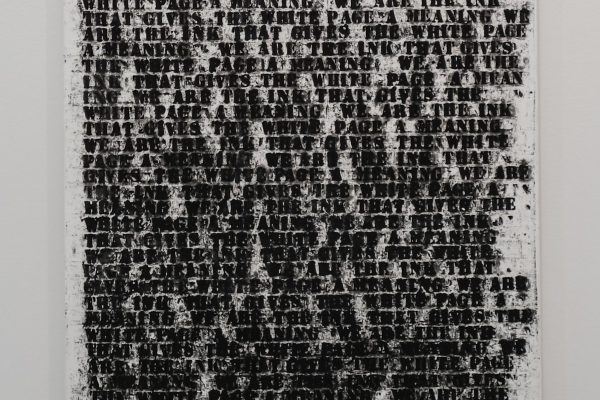There has been much debate about a new and distinctively Islamic anti-Semitism in Germany after a kippah-wearing Israeli was attacked by a Syrian refugee last month on a busy street in Prenzlauer Berg, Berlin’s hippest neighborhood and a bastion of urban tolerance. The victim managed to film the incident and the video went viral. Moral outrage in Germany and a worldwide outcry followed. Even Angela Merkel, typically hesitant to criticize the refugees she had invited into the country, spoke of “a new form of anti-Semitism” that the state must resolutely fight. A few days later, thousands of Germans, with yarmulkes on their heads, took to the streets to demonstrate solidarity with Jewish people.
A closer look at Germany’s ‘new anti-Semitism’ reveals a comedy of errors framed by the nation’s current political and cultural anxieties.
But a closer look at what happened reveals a more complicated picture, with elements of a comedy of errors, framed by Germany’s current political and cultural anxieties. Yes, the victim, Adam Armoush, was a kippah-wearing Israeli. But, as it turned out, he is an Arab Israeli from Haifa, who was wearing a kippah as an “experiment”—to prove wrong a Jewish friend who had told him that identifying openly as Jewish was no longer safe in Berlin. He presumably expected to find a tolerant Berlin in contrast to intolerance in Israel (where he might encounter anti-Arab sentiment, religious bigotry, homophobia, etc.). His assailant, who yelled “Yahudi” at him and furiously lashed him with a belt, was a Palestinian from a Syrian refugee camp—one of a million refugees let in by Angela Merkel in 2015, in a grand humanitarian gesture that was also meant to atone for the Holocaust and show the “friendly face” of the new Germany. Germany’s enthusiastic embrace of thousands of Israelis (including Armoush) who have been flocking to Berlin in recent years is part of the same symbolic reversal: instead of persecuting Jews, Germany now offers them respite from the social and political hardships of life in Israel. The attack on Armoush, then, was partly an unintended outcome of two well-intentioned German policies colliding with each other. Rooted in the same sense of historical guilt, they brought a miniature version of the Middle East conflict to Berlin.
The ironic twists do not mean that there is not a problem with anti-Semitism in Germany. The attack on Armoush was not an isolated incident. Other recent examples include the public burning of Israeli flags in protest of Donald Trump’s decision to relocate the U.S. embassy to Jerusalem and the bullying of a British-Jewish teenager in a Berlin high school by Muslim students. Yet many questions remain: how big is the problem, what is its exact nature, and what can be done about it? Is the talk of a new and distinctively Muslim anti-Semitism in Germany justified?
In Germany the discussion is confused. Supporters of Merkel’s immigration policy on the center-left have a hard time acknowledging trouble caused by immigrants, in part because they don’t want to appear Islamophobic, but more because they don’t want to offer additional ammunition to Germany’s newly-emboldened far right, which has exploited anti-immigrant resentment in Germany with remarkable success. The Alternative für Deutschland (AfD) is not only the first far-right party to get into the German parliament since the fall of the Third Reich, but it did so with a bang, winning the third largest share of the vote in the 2017 federal elections. The AfD has put the notion of the “new” anti-Semitism to effective use to further its Islamophobic agenda, even posturing as the defender of German Jews and Israel. This would be a case of strange bedfellows, one might think, but the xenophobia of Germany’s new radical right is directed against Muslims rather than Jews; in this, it is closer to today’s Israeli right than yesterday’s German Nazis. (Traditional anti-Semitism, though, is alive in other ways in the AfD—for example, in the historical revisionism of AfD leaders such as Björn Höcke, who want to restore German national pride by dismantling one pillar of postwar German political culture: remembering and doing penance for the Holocaust.)
Crime data in Germany does not support the claim that a new, immigrant-driven anti-Semitism is on the rise. According to a police report released this February, of the 1,453 anti-Semitic offenses recorded in Germany in 2017, by far the majority, 1,377, were perpetrated by extreme-right groups; only twenty-five had a Muslim connection. As Angela Merkel reminded Germans: heavily armed police officers protecting Jewish institutions have regrettably always been part of the postwar German cityscape.
Germany has supplied ample evidence that it is quite possible to read Rilke poems in the morning, play Beethoven at night, and shoot Jews during the day.
Anti-Semitism in Muslim countries is widespread, but it is neither new nor distinctively Islamic. It is, rather, an anthology of Europe’s greatest anti-Semitic hits. When I lectured in Indonesia in 2008, every bookstore I visited stocked books such as Mein Kampf, a history of the Waffen-SS, Henry Ford’s The International Jew, a volume titled Holocaust—Fact or Fiction?, and The Protocols of the Elders of Zion. An infamous Russian forgery of the early twentieth century, The Protocols of the Elders of Zion are a bestseller in many Muslim countries, still propagating the myth of a malicious Jewish cabal plotting to take over the globe.
There are traces of anti-Jewish sentiment in Islamic texts from the Quran onwards, but it comes nowhere close to the virulent and pervasive anti-Judaism in Christianity. Anti-Judaism in Islam, moreover, was rarely translated into policy. Unlike what happened in Christian Europe, persecution was the exception rather than the rule. As historian Mark Cohen has shown in a meticulous comparative study, up to modern times, Jews in general fared much better under Muslim rule than they did under Christian rule.
In the twentieth century, however, anti-Semitic conspiracy theories imported from Europe became the conduit for much resentment in Muslim countries—over colonialism, the oppressive regimes that followed decolonization, a sense of inferiority toward the “Christian” West, the emergence of Zionism, and the string of defeats in the Israeli–Arab conflict. Much genuine misery was blamed on an imaginary Jewish world conspiracy. The Israeli–Arab conflict in part explains this choice of outlet. But as David Nirenberg has noted in his classic study of the history of anti-Judaism, ever since antiquity, Jews—real or imagined—have been everyone’s favorite punching bag. On top of this, oppressive regimes in Muslim countries encourage hostility toward Jews and Israel (deliberately blurring the distinction) for self-serving political purposes. When I lived in Cairo in the early 2000s, Egyptians had many reasons to be aggrieved under the regime of Hosni Mubarak, but only one state-sanctioned venue for venting anger: weekly demonstrations in front of the Israeli Embassy.
That Muslim immigrants bring some of this ideological baggage to Germany is undisputed. How many of them hold such beliefs and how they are affected by the new social and political context is less clear. A 2017 expert study of anti-Semitism in Germany, commissioned by the German parliament, concluded that Muslim anti-Semitism is being inflated. But it also acknowledged that Jews themselves now attribute more than half of the anti-Semitic abuse they experience to Muslims. Felix Klein, the new “anti-Semitism officer” of the German government, wants to solve this puzzle by putting a new system in place to gather and evaluate relevant information.
Meanwhile, a qualitative study of Muslim anti-Semitism in Germany by the Israeli political scientist David Ranan is causing a stir. Ranan’s book hit German bookstores at the end of March, just as the public debate was switching into high gear. In interviews with 70 Muslims in Germany, many of them university-educated, he came across the whole gamut of anti-Semitic tropes: from Jews pulling the strings of world politics behind the scenes to Israeli soldiers targeting Palestinian children and selling their organs. But Ranan insists that his findings are no reason to worry about a threat to public order in Germany. Behind the tropes, he argues, is not religious antagonism but, above all, the Middle East conflict and the conflation—common in Muslim countries—of Israelis and Jews.
This interpretation seems reductionist. It does not take into account the wider set of problems in Muslim countries that fuels the anti-Semitic imagination, or the specific pressures Muslim immigrants face in Europe, such as Islamophobia or the rhetoric of jihadist recruiters whose vision of an apocalyptic battle between Islam and the West fits neatly with the belief that the West is controlled by the Jews. But regardless of how the problem of Muslim anti-Semitism is framed, Ranan’s conversations leave no doubt that there is one.
Germany has done an impressive job building a culture of remembering the Holocaust. Now is a good time to complement it with a culture of pride in more than seventy years of stable liberal democracy.
What is to be done? After the attack on Adam Armoush, there was a chorus of calls for tougher prosecution of anti-Semitic hate crimes. But legal measures and law enforcement, though necessary, are not sufficient. As the seventeenth-century philosopher John Locke argued, threatening punishment may deter people from doing wrong, but it won’t change their minds.
The buzzword in Germany for tackling challenges related to immigration is “integration,” though what this means precisely is unclear. Conservatives propose that immigrants should be assimilated to a German “Leitkultur”—the core values of German history and culture (whatever these may be). Critics stress the chauvinistic character of this proposal. An acrimonious debate over Leitkultur has been going on since the late 1990s. A day after yarmulke-wearing Germans staged a protest in solidarity with Armoush and German Jews, the conservative governor of Catholic Bavaria, Markus Söder, decreed that every government office in his state must display a crucifix “as an expression of Bavaria’s historical and cultural heritage and a visible acknowledgment of the fundamental values of Germany’s political order.” Söder’s goal was to signal that Islam doesn’t belong in Germany—a slap in the face for the hundreds of thousands of Turkish migrant workers, the Gastarbeiter, who, since the 1960s, have done the jobs that Germans did not want and helped rebuild the country’s economy. But such state-sponsored symbolic violence does not only affect Muslims. Although the Islamophobic imagination in Germany typically portrays Islam as alien to “Judeo-Christian civilization,” the hyphen in “Judeo-Christian” is a hypocritical sleight of hand. For Christians, the cross signifies redemption through Christ’s death, but for Jews it evokes two thousand years of persecution as supposed Christ-killers (a charge first made in John’s Gospel and only dropped from official Christian teaching after the Holocaust).
Fortunately, most Germans hold less chauvinistic views about what “integration” means. When I visited Berlin last summer, I took my children to see Peter and the Wolf at the Komische Oper. In the audience were several school classes of refugee children who came to watch Prokofiev’s symphonic fairy tale in German and Arabic. Teenagers from Syria and Afghanistan were called up on stage to translate the names of classical instruments into Arabic and Persian. Initiatives like this are well-intentioned—though they would smack less of paternalism if Germans brushed up on some Rumi and Naguib Mahfouz at the same time. But is such cultural exposure enough to dispel anti-Semitic attitudes? Germany, after all, has supplied ample evidence that it is quite possible to read Rilke poems in the morning, play Beethoven at night, and shoot Jews during the day.
Another proposal is to take refugees to the sites of former concentration camps to teach them about the Holocaust. The most vocal advocate of this idea happens to be the daughter of Palestinian exiles: Sawsan Chebli, the secretary of federal affairs in Berlin’s state government. Chebli wants to make concentration camp tours mandatory for everyone who lives in Germany. Last year Navid Kermani, a German writer of Iranian background, movingly described in the Frankfurter Allgemeine Zeitung how he came to embrace the burden of German history in Auschwitz when visitors were divided up according to the languages they spoke. As he pinned a sticker saying Deutsch to his shirt, he suddenly felt the pinch of German guilt. But this is a best-case scenario. In Winter Journey, a play by the Israeli director Yael Ronen, which premiered last year at Berlin’s Maxim Gorki Theater, refugees from Syria, Afghanistan, and the Palestinian territories take a two-week road trip to get to know Germany. One of their stops is at Buchenwald. But having just narrowly escaped the tragedies of their own countries, they are weary of engaging with the tragedy of another people so immediately. “The night after Buchenwald was terrible,” says one of the characters, “everyone had nightmares.” Leaving the theater, less benign responses from real visitors are easy enough to picture: if everyone is forced to take a concentration-camp tour, die-hard anti-Semites might well dismiss them as fakes, staged by the Jewish world conspiracy, or, worse, even endorse their purpose.
Such integration initiatives are good, but in one sense they overreach, in another they fall short. Consider again Adam Armoush’s assailant: he does not need to read Goethe, listen to Beethoven, cheer for the German soccer team, feel personal guilt about Auschwitz, or identify with Bavaria’s Christian past. He only needs to respect the values of the German constitution, starting with Article 1: “Human dignity is inviolable.” This rules out anti-Semitic slander and, of course, anti-Semitic attacks. Yes, it is an old idea: philosopher Jürgen Habermas elaborated it under the label “constitutional patriotism” in the 1980s. But it still seems to me the best starting point for integration in Germany.
Integration intiatives are well-intentioned, but ‘constitutional patriotism’ is more important.
Germany has done an impressive job building a culture of remembering the Holocaust. Now is a good time to complement it with a culture of pride in more than seventy years of stable liberal democracy. These are values that existing German citizens and those who aspire to become new ones can celebrate together as they underpin the political and social space they share.
At the same time, new immigrants should not have to shoulder all the burden. Armoush’s assailant was wrong. But there is an urgent need to discuss the complex causes that lie behind the rage fueling anti-Semitism—while insisting that Jew-hatred is always misdirected. This debate must involve a reckoning with the ways in which the West, and Germany in particular, contributed to the problems in the regions where refugees come from: the legacies of colonialism and European anti-Semitism, how these are entangled with the conflict in the Middle East, the realpolitik-driven meddling in Afghanistan during the Cold War, the collaboration with corrupt regimes and autocrats to further economic interests, and so on. Anti-Semitism should be rejected unequivocally. But to treat it only as a moral flaw, and not also as a symptom of genuine problems, is disingenuous.








